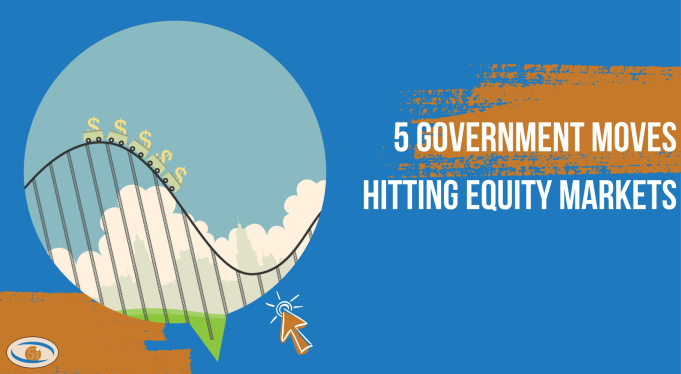This year has been a roller coaster ride of uncertainty, anathema to the stock market. But governments are not helping.
Are we having fun in the markets yet? This year has been a roller coaster ride of uncertainty. As most investors know, uncertainty is not good for the stock market. It is hard for companies to plan when they do not know what input costs, interest rates, or labour markets are going to be. Taxes are changing, currencies are plunging, markets are swooning and one social post can change everything in a second. In any market, there is always some uncertainty. But governments are not helping things much these days. Let’s look at five recent events that have contributed to investor angst this year.
Fed independence
While U.S. President Donald Trump walked back comments on Tuesday, leading to a relief rally in the stock market, it has been less than a week since he called Federal Reserve chairman Jerome Powell a “major loser” and posted “his termination cannot come fast enough” on his Truth Social network. Any attempt to change the independence of the Fed will not be well-received by investors. We at 5i Research think Powell, with a Princeton degree, seven years of Fed experience and excellent work and education credentials, knows more about the economy than anyone in the current government. He steered the U.S. economy safely through the COVID-19 pandemic and managed to successfully fight off inflation. Frankly, we think he has done an excellent job. The government needs to leave him alone, and focus on their other goals.
Increased withholding taxes
There is a new bill proposed in the U.S. government that would increase withholding taxes on U.S. investments to Canadian investors. If passed, the proposed legislation would add five percentage points to the withholding tax rate each year for four years on certain types of U.S. income to Canadians. The bill appears to be in response to Canada’s digital services tax imposed on large U.S. technology companies last year. While the bill does not have a great chance of being passed (we hope), just the fact that the U.S. is contemplating such moves at a time when capital is already fleeing the country is quite ridiculous. Valuations in other markets remain cheaper than in the U.S., and if taxes to international investors increase there is even more incentive for investors to move money out of the country. Countries are supposed to attract capital for growth, not push it away. This is Economics 101.
Tariffs
We have discussed this before so will keep things brief but tariffs have never worked. If readers disagree, send examples. I’ll wait. But it’s not so much the tariffs themselves that are hurting investors’ confidence. It is the daily (hourly?) flip-flops of policymakers’ decisions. Investors and companies, and probably the government themselves, don’t know what the tariff rate is supposed to be today for any one country. Tariffs are implemented, then changed, then delayed, then cancelled, then added again. It’s no wonder many companies are pulling earnings guidance: They have no idea what’s going on, and are putting their heads in the sand until this whole issue goes away. It is not helping markets right now.
Pardoning criminals
We will reference here Trevor Milton, the former chief executive officer of Nikola Corp., who was convicted of securities and wire fraud and sentenced to four years in prison. His crime was exemplified by Nikola famously rolling a truck down a hill for a marketing video, claiming it was powered by the company’s electric vehicle technology. I can’t make this up: it was rolled down the hill. The company was worth US$30 billion at its peak in 2020, according to CNBC and has now filed for bankruptcy protection. But a few weeks ago, Trump pardoned Milton and he is now a free man. Did the US$1.8 million political donation Milton make help his case? Trump, as president, is of course allowed to pardon people. But what about investor confidence in capital markets? Here we have a man convicted of fraud, where investors lost US$6 billion as the company declined in market value after the fraud disclosure, set free after a very brief prison stint. Global investors must look at this and just shake their heads.
Budget deficits
For our last point we will shift back to Canada. With an election just days away, we know better than to make political comments. But the two largest political parties outlined their fiscal plans in the past two weeks. The Conservative Party of Canada’s plan is more focused on tax cuts, making up about 70 per cent of their new measures. In contrast, the platform released by the Liberal Party of Canada is more focused on new spending, which accounts for about two-thirds of their proposals. Without commenting on which one is better, we would note that both would continue to show massive budget deficits. Yes, we know how elections work: Each party is trying to get elected here. But for investors in Canada, and global investors looking at Canada, maybe it’s time to put our economic house in order and reduce deficits as fast as possible. With investors currently fleeing the U.S., Canada has a chance to move up on the world’s economic stage. Let’s hope whoever wins next week realizes this and starts acting economically appropriately.
Unlock the Power of Informed Investing with 5i Research!
DIY investing doesn't have to mean going it alone. At 5i Research, we're your trusted partner in navigating the stock market. Our platform offers comprehensive stock and market research, empowering you to make smart investment decisions.
- Investor Q&A: Have burning questions? Get answers from our team of experts and fellow investors in our dedicated Q&A section.
- Research Reports: With over 60 meticulously researched Canadian stocks, our reports offer in-depth analysis, giving you the confidence to invest wisely.
- Model Portfolios, Alerts, Forums, Portfolio Tracking, and Much More.
Take Care,







Comments
Login to post a comment.